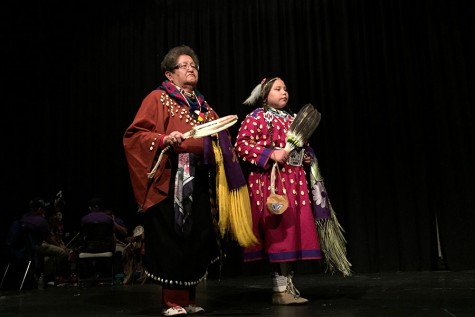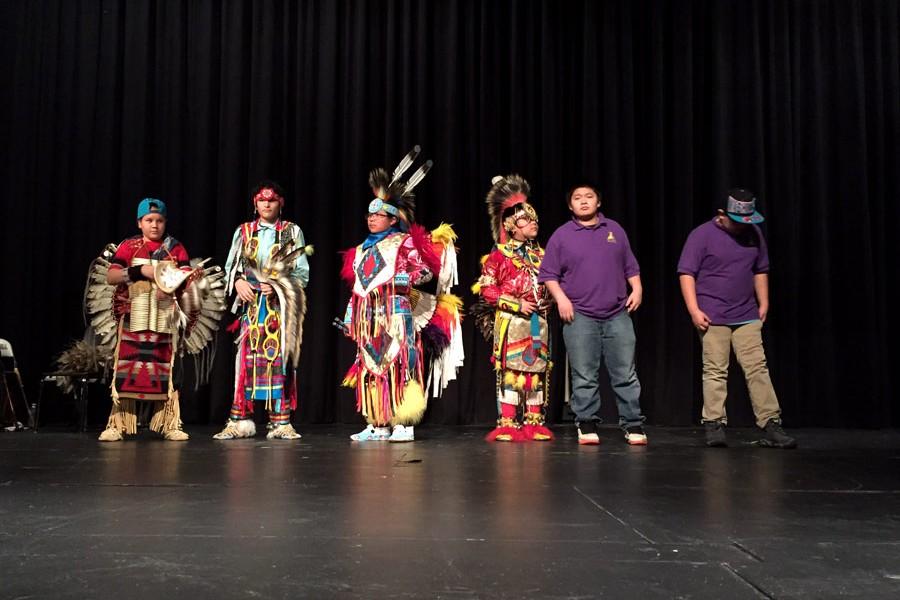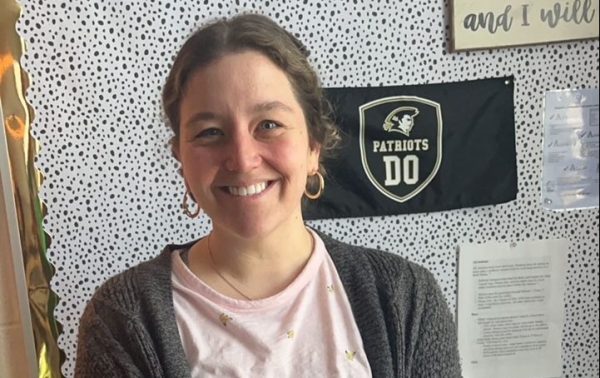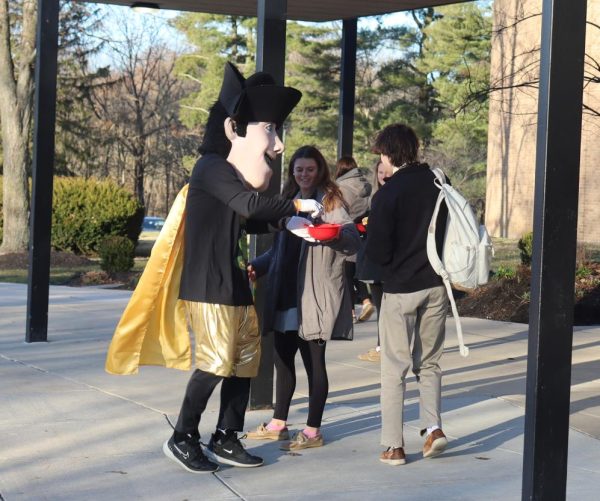Strengthening friendships through tradition
The annual Morning Star Powwow at JC is an opportunity to learn about Native American culture and enjoy traditional dancing and music.
Students from St. Labre Indian School take the stage after a brief presentation about traditional Native American music and dance styles. Dancers and drum group members performed in The Morning Star Powwow on Jan. 9.
40 traditional Native American dancers tentatively walk through the halls of JC, preparing to dance in the first Morning Star Powwow. In an effort to start the tradition of a benefit powwow on the East coast, Vice Principal of Academics Gary Scholl began hosting The Morning Star Powwow here at JC.
“A powwow is a gathering of American Indian people to renew friendships and family ties while doing traditional dances and singing traditional songs. It’s just a big community celebration,” Scholl said.
There are three different types of powwows: benefit, tribal, and competition. Anybody can attend them, whether as a dancer, drum group member, or spectator. According to Scholl, there is no need to be native or of a certain tribe to attend, because powwows are not primarily ceremonial, rather they are social events.
The first Morning Star Powwow at JC was in 2001. “We need to start here on the east coast the tradition of benefit powwows because that’s what most of the powwows are out west,” Scholl said as to why he took the initiative in having a powwow.
The first powwow was small, with only 40 dancers and 10 to 15 vendors, but now there are 20 vendors and over 125 dancers that come from all over the country. “It’s grown because we do it right, and the Indian community has supported our powwow because it has a good spirit,” Scholl said.
Every year JC donates one hundred percent of the profits from the powwow to St. Labre Indian School in Ashland, Mont. St. Labre is important in the Northern Cheyenne and Crow communities because it offers a quality education that students on the reservation would not have access to otherwise.
“We’ve seen that the percentages in statistics show how low the graduation rates are and how low college acceptance rates are for Native Americans, and we are trying to break those statistics by making sure that our kids receive the highest quality education,” said Major Gifts Officer for St. Labre Tony Uceda.

Nellie Speelman, who is St. Labre’s Home-School Coordinator, and a student prepare to perform the Women’s Traditional Dance during a presentation at The Morning Star Powwow.
Like many other American Indian reservations, the Cheyenne and Crow reservations both have pockets of deep poverty. St. Labre helps to build a better future. “It’s an opportunity for those kids to get a good quality education and learn about the possibilities that are out there for them,” Scholl said.
Considering the economic disparity on the reservation, all students go to St. Labre totally free, or on a minimal tuition, depending on their situation. As a result, St. Labre is completely funded by donations like the donation made from the profits of The Morning Star Powwow.
St. Labre is also important because it helps strengthen the native culture and pass it on to future generations. According to Scholl, students learn the traditional Cheyenne and Crow languages, as well as crafts such as tanning hides and painting.
After years of keeping in contact with St. Labre and donating to them, JC and St. Labre have come to consider each other “sister schools.” Last summer a group of students volunteered in a Catholic Heart Work Camp service trip at St. Labre, and a group of students will return this coming summer.
“Being at St. Labre in Montana and interacting with the natives was an amazing experience, and I hope students continue to visit and strengthen the relationship with St. Labre,” senior volunteer Claire Grunewald said.
JC hopes to continue its communication with St. Labre for years to come. “I believe throughout the years we have been able to create stronger and stronger ties between John Carroll and St. Labre. Our only hope is that we can continue to make the program grow, and the relationships can become stronger,” Uceda said.
Katie Sullivan is an In-Focus Editor for The Patriot and jcpatriot.com.





